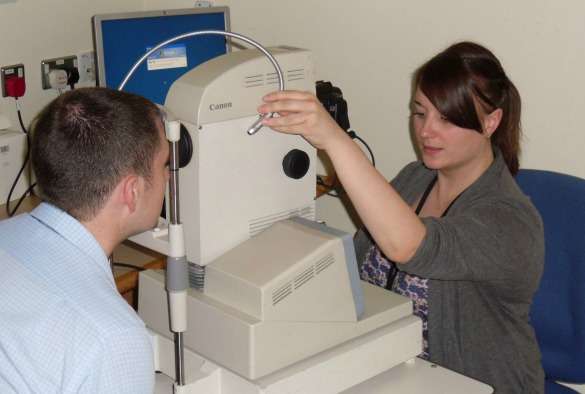Thousands join diabetic eye disease trial

More than 4,500 people from Liverpool with diabetes have volunteered to join a clinical trial funded by the National Institute for Health Research (NIHR) to help transform early detection of diabetic eye disease.
Volunteers to the University of Liverpool trial, one of the largest of its kind so far, will undergo a novel, innovative screening method which aims to help more accurately calculate the risk of disease for each patient, rather than applying a 'blanket' approach to all.
Diabetic retinopathy is one of the most common causes of visual loss in the world and can be prevented if it is detected early. High blood sugar causes the fine blood vessels in the retina to leak fluid or to close resulting in the retina becoming starved of oxygen and waterlogged.
Leading research
A patient with diabetic retinopathy will not be aware of the problem until vision declines, a stage when the damage is often irreversible. Prompt laser treatment, injections of drugs into the eye, or complex surgery, is required to limit the damage.
The University of Liverpool in partnership with the Royal Liverpool and Broadgreen University Hospitals NHS Trust has been leading research into eye screening for the disease since 1991, which includes retinal photographs being taken once a year to show the early stages of retinopathy.
The impact of this new trial, however, is that patients at lower risk could only require tests every two years and those at higher risk can be checked up to twice a year.
Tailored diagnosis and treatment
Professor Simon Harding, from the University's Institute of Ageing and Chronic Disease and Chair of Clinical Ophthalmology at St Paul's Eye Unit, said: "By basing the timing of the eye screening on a number of different variables, such as the amount of retinopathy, the level of control of blood sugar, blood pressure and cholesterol, we can tailor diagnosis and treatment to the individual rather than a 'one size fits all' approach.
"Attending high numbers of clinics each year is a huge problem for people with diabetes so it is important to shape methods of detection to the individual's needs so that it causes minimal disruption to their lives and crucially catches signs of the disease at the earliest opportunity.
The trial, funded by the National Institute for Health Research (NIHR), will take two years to complete and if the system proves successful it will be rolled out into screening programmes around the world.

















